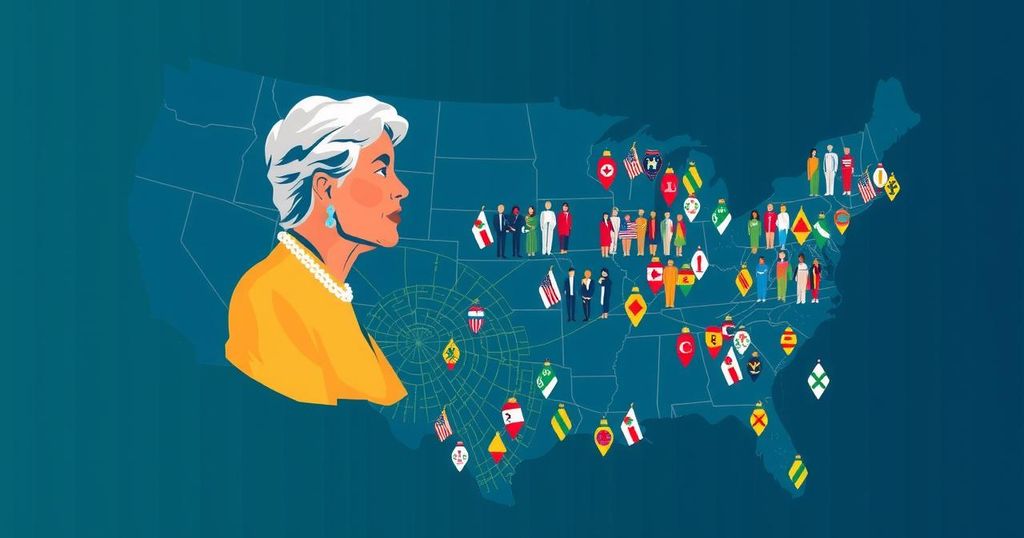US Presidential Candidates Align with Global Rightward Shift in Immigration Policy
A significant rightward shift in U.S. immigration policy is being observed as both major presidential candidates, Donald Trump and Kamala Harris, advocate for stricter measures. While Trump emphasizes the threat posed by undocumented immigrants, Harris has pledged to enhance border security, reflecting a growing influence of far-right ideas in mainstream politics. This trend is mirrored in various European nations, where far-right parties gain traction and push for more restrictive immigration policies, raising concerns about the erosion of traditional asylum rights.
The resurgence of immigration as a pivotal issue in the United States presidential race illustrates a broader global trend toward right-leaning politics concerning immigration policies. Former President Donald Trump has persistently emphasized a narrative of threat associated with immigration, labeling undocumented immigrants as criminals. For instance, during a recent rally in Aurora, Colorado, he proclaimed intentions to orchestrate the “largest deportation operation in the history of the United States,” promising to “close the border” and halt what he terms the “invasion of illegals”. In a similar vein, Trump asserted that undocumented immigrants pose a direct threat to citizens’ safety, stating they would “enter your home and cut your throat”. As the electoral contest intensifies between Trump and Vice President Kamala Harris, it is evident that both major parties are gravitating towards stricter immigration policies. Harris has publicly pledged to enforce more stringent border controls and has previously supported robust border control legislation that many may consider a departure from traditional Democratic values regarding asylum rights. Experts argue this rightward shift in immigration policy reflects the influence of far-right ideologies infiltrating the mainstream political discourse. As articulated by migration and human rights lawyer and anthropologist Petra Molnar, “There’s this spectre of being overrun by ‘the other’ that has always been there… it seems to have filtered into the entire conversation around immigration.” Notably, this phenomenon is not isolated to U.S. politics; nations across Europe are undergoing similar transformations. Recent electoral successes of nativist parties in the UK and Germany, such as the Reform UK Party and Alternative for Germany (AfD), underscore a growing acceptance of restrictive immigration policies. Marine Le Pen’s success in coalition politics in France further reinforces the trend towards hardline immigration stances across the political spectrum. Additionally, mainstream political entities, aiming to mitigate the impact of far-right rhetoric, have adopted similar hardline positions on immigration, leading to a correlated increase in restrictions on the right to seek asylum. These evolving policies illustrate a divergence from established international norms regarding sanctuary for asylum seekers. In the United States, this shift has been reflected in the Biden administration’s immigration tactics, where President Biden adopted several of Trump’s immigration policies. Initially, Biden posited to differentiate himself from Trump’s approach, advocating for a restoration of asylum rights; however, upon taking office, he maintained numerous restrictive measures, further complicating the immigration narrative. Vice President Harris, now leading the Democratic ticket following Biden’s withdrawal from the 2024 race, has indicated intentions to amplify restrictions beyond those instituted by the previous administration. In her recent remarks in Douglas, Arizona, Harris advocated for harsher consequences for unlawful crossings and reiterated commitments to keep borders secured, while expressing an openness to expanding legal immigration pathways. This political environment illustrates the intricate dynamics surrounding immigration that compel both parties to adopt stringent narratives to ward off far-right pressures, complicating the discourse on the necessity and benefits of immigration within societal frameworks.
The article addresses the growing trend among political leaders in the United States and Europe toward embracing increasingly restrictive immigration policies amid fears surrounding immigration. It highlights how former President Trump has campaigned on anti-immigrant sentiments, suggesting potential violence associated with undocumented immigrants. Concurrently, Vice President Kamala Harris has begun to echo these sentiments with her own promises for enhanced border security — demonstrating a seismic shift in immigration rhetoric that has historically been the domain of far-right politics. This evolving political landscape underscores the influence of populism and rising concerns surrounding immigration across various nations.
In conclusion, the current political climate reflects a significant shift towards right-leaning immigration policies by both Democratic and Republican candidates in the upcoming elections. This trend not only mirrors a broader global phenomenon but also illustrates how far-right narratives have become influential among mainstream political discourse, complicating conversations about the rights of asylum seekers and the benefits of immigration. The convergence of these positions among U.S. political figures may have profound implications for the future of immigration policy in America and beyond.
Original Source: www.aljazeera.com




Post Comment